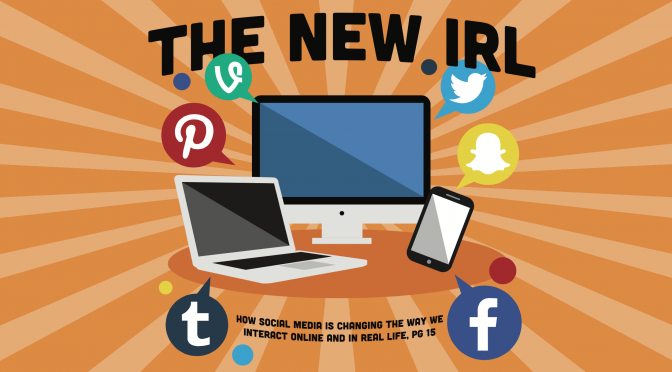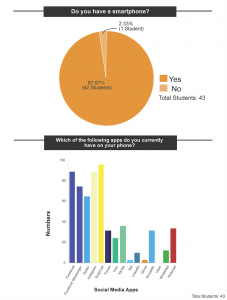
A social media “app-raisal”
By: Annie Sragner, Arts and Life Editor
Modern social media allows users to conscientiously sculpt their online identities and carry a savvy mindset into their real lives.
Studies show that teens spend an average of nine hours using social media daily, a three-hour increase since 2004.
To grasp exactly how Towson students utilize social media, The Towerlight conducted an online survey.
Of those who responded to the survey, 58 percent said they find social media either “very important” or “somewhat important” to their lives. No one said it is “not very important.”
While Facebook was once the dominant social media platform, that may be changing – at least among the college-aged demographic. According to the survey, 30 percent of students said that Snapchat was their favorite platform, while only nine percent said the same of Facebook.
With this skyrocketing usage of technology, there is much debate over the long-term effects of social media.
Cylor Spaulding, an assistant professor in the mass communication department, has noticed a careless attitude caused by social media in his students.
“They think they understand social media because they are on these networks, but they don’t understand the impact it can have on them or how to use it strategically,” Spaulding said.
Many are concerned about the toll social media takes on our real social lives. Although it is called “social” media, this phenomenon may be more like antisocial media.
“I feel like it makes the social people in life less social and the less social people in life more social,” sophomore Zoe Winslow said. “The more introverted people are going to not care what people say and they are going to find people that have different interests. The more social people are more afraid that stuff is going to come and ruin their reputation, so they limit what they do.”
Social media also lowers inhibitions when it comes to face-to-face interactions.
“If you were going to ask someone on a date in person, you might feel anxious about it or you might be worried about the rejection,” Spaulding said. “But on social media, people aren’t really worried about that because it’s like, ‘well whatever if they reject me it’s not in person so I don’t really have anything to lose.’”
This widespread relationship that technology users have with social media also impacts how we function independently.
“It’s going to create a sense of individualism, but not necessarily in a good way. It’s also going to create a dependence on technology,” Spaulding said.
The breakdown of direct interaction and the shift to technology as necessity rather than luxury can influence the way individuals act collectively.
“If it keeps going to way it is, we’re going to have an ever further erosion of sense of community,” lecturer Andrew Reiner said. “There are neighborhoods where people get together and do things together— but that’s the exception, that’s not the rule anymore.”
This rampant cultural shift also makes it difficult to define one’s real world identity from an online persona.
“I tend to think of it as curating, because you are going to such lengths to make sure that the smallest details are being perceived a certain way,” Reiner said. “There is this gnawing fear beneath all of it, this anxiety that you are going to appear as less than perfect. I think it breeds this completely paralyzing social perfection.”
This drive for excellence sweeps beyond our social interactions and causes society to want this perfection in all aspects of life. Efficiency is closely valued and technology allows us to do more than ever before.

According to our survey, 64 percent of students reported to prefer using social media on their readily accessible smart phones rather than sit down at a computer.
“I think we are doing more and faster, but more and more studies show that multitasking is a myth,” Reiner said. “Yeah, you can do a bunch of things at once, but there is no real critical engagement when you are just surface dwelling and not doing much.”
As a member of the executive board of the Latin American Student Organization (LASO), sophomore English major Emely Rodriguez merges her professional life with her online social life. She promotes and advertises for LASO while managing her personal account from the same Twitter profile.
“Other than Twitter for advertising and promoting, I’ll use social media to look at what’s new,” Rodriguez said. “Like if Drake posted a new video or if there are new vines, because that’s always just funny. I like things that lift you up and keep you up to date.”
This update-oriented framework of business and the crafting of public images have closely evolved along with the growth of social media. Spaulding worked directly with public relations agencies during the rise of social media.
“At that time, we were doing a lot of unethical things,” Spaulding said. “When I was working at the agencies, we had to go in and edit our clients’ Wikipedia pages because they didn’t want them to talk about certain things, so they were trying to frame their own message. Back then when it first started, no one though anything about it, but if a business tried to do that now, then that’s a red flag.”
Winslow expressed some skepticism of the security and privacy promised by social media platforms.
“I’ve been hacked.” Winslow said. “I got text messages from people telling me that I’m writing things on their Facebook wall. I had to change my password and do damage control. It was an invasion of privacy, so throughout the years it’s going to be harder to have any sort of private life without being skeptical.”
Winslow is not alone in her thoughts on social media privacy. Other applications, such as Snapchat, promise users that their photos disappear after sending.
“As for Snapchat, I believe that they disappear, but that doesn’t mean that they can’t be retrieved,” Spaulding said. “I’m sure that Snapchat has some kind of backup system, so I’m sure in some way, shape or form they are archived. You just have to be really careful because anyone can go in and see that.”
Only 50 percent of those surveyed who use “anonymous” apps like Yik Yak said that they trust the application not to disclose their identity. The other half either didn’t trust anonymous apps or had never given the issue any thought before.
It was just a little over a year ago that Towson University student Matthew David Cole used YikYak to post a threatening message, and was subsequently located and arrested using the GPS coordinates of his phone.
“It’s not as anonymous as you think,” Spaulding said.
After his trial in July, Cole entered a plea deal, paid $57 in court fees and has been placed on unsupervised probation until February 2017.
Reiner teaches an Honors Seminar called “The Search for Intimacy in the Age of Facebook.” In it, he has students conduct experiments – some go on a social media “cleanse,” others go into dining halls on campus, alone, and eat a meal without using technology, books or homework to distract them.
“In a culture in which we are so terrified of not looking like we’re connected so that we fit in, it’s like a splash of cold water saying it’s not that hard to be disconnected and out of the loop,” Reiner said. “It’s not the end of the world. It’s a way to get some students to reexamine the relationship they have because so many people say I never really thought about it.”
— Cody Boteler contributed to
this article.

